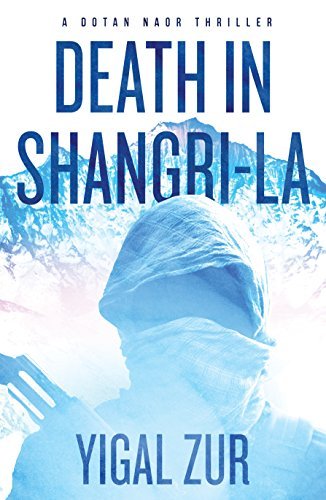
Written by Yigal Zur, translated by Sara Kitai — Israeli thriller writer Yigal Zur skillfully uses both an exotic setting and ongoing international turmoil to create a high level of tension in this fast-paced thriller. Published in Israel in 2012, Death in Shangri-La is the first of Zur’s novels to be translated into English, quite smoothly, in fact.
A trip to India after their military commitment has become rite of passage for many Israeli young adults. When one of those Israelis seems bent on abandoning a future law career and immersing himself in the life of an ashram somewhere in Sikkim, his father, arms dealer Willy Mizrachi, is outraged. He complains about it to his acquaintance, former security agent Dotan Naor, familiar with India from his days working for Israeli state security.
While Dotan counsels him to accept his son for who he is, without judgment, Willy is determined to bring him home. In an action that will have deadly consequences, Willy wagers that within a year, he’ll have his son happily back home, with a wife and baby.
In spring of the following year, Dotan learns that a cascade of trouble has begun. Willy was murdered in Delhi and news reports are suddenly full of stories of terrorist attacks on Israeli young people in north India – backpackers, guesthouse visitors, honeymooners in a houseboat on Lake Dal.
Most of the novel is told in first-person, but the attacks on the Israelis are told from their points of view and those of the Indian army and others who come to their aid. This approach effectively conveys the chaos in emergency responses when no one is sure what’s going on. For people back home, the confusion is underscored by cell phone messages and videos from the victims.
Shortly after Dotan learns about Willy, two security agency agents arrive, one of them a woman, Maya Kfir. They hope Dotan will work with them to unravel Willy’s murder, because it will put Israeli arms manufacturers under a microscope. Alas, they don’t know where to start.
Dotan at first refuses, but when a letter turns up in which Willy says he is being watched, it contains enough clues that he decides to take the job. Maya Kfir arranges the authorisation, but will go with him. You can see where that relationship is going.
The action moves to India, and Zur wonderfully evokes a sense of place. His descriptions of the street life, the seedy hotels where Dotan and Maya stay, the markets, the food, are a fascinating trip without jet lag. The elements of the environment are not just pasted on, they are well worked into the plot. Could this story have taken place anywhere else? Probably not.
In the course of trying to untangle Willy’s death and the lengths to which he was willing to go to win his casual bet, Dotan and Maya find themselves in the heart of the current terrorist trouble spot and drawing on Dotan’s contacts with Indians on both sides of the law. The Muslim terrorists, drug runners, Tibetan freedom fighters, the Indian army – all have their agendas and many seem to have guns manufactured in Israel. Are they Willy’s deadly legacy? Dotan is repeatedly warned that he’s in dangerous territory, that India has changed since he worked there. “Moderate, gentle, non-violent India with its inborn benevolence had gradually been eroded by waves of violence,” he says.
The main part of the story takes place in a highly compressed few days and the propulsive action keeps the pages turning. My only complaint is Dotan – a man in his 40s, not a teenage boy – is obsessed with the sexual conquest, past, present and future, of practically every woman in the story. I’m not opposed to eroticism, but when he develops a supposedly sincere, if highly predictable, relationship with Maya, it’s hard to take seriously.
This is the middle one of three thrillers about Dotan Naor. I hope the others will be translated too.
Also try Smoke and Ashes by Abir Mukherjee, Countdown to Osaka by Joe Heffernon, or Colin Cotterill’s Six and a Half Deadly Sins.
Oceanview Publishing
Print/Kindle/iBook
£5.11
CFL Rating: 4 Stars